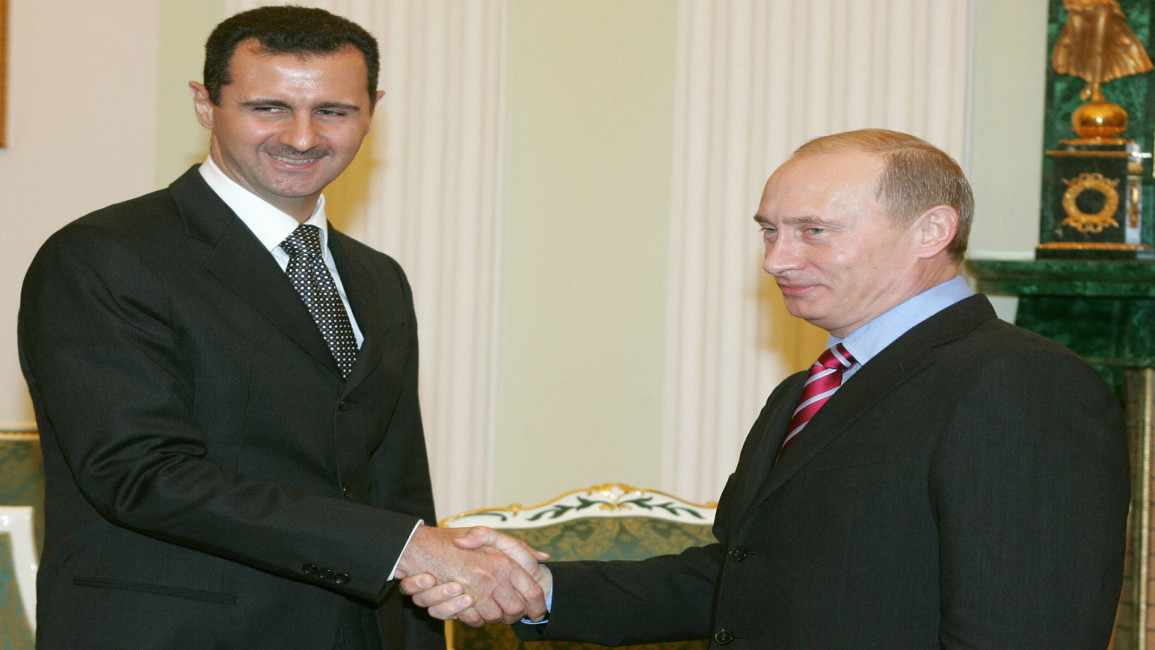
Who is Putin really protecting Assad from?
In Ukraine, Moscow has openly declared that its motive for intervention and support for separatist forces has been to counter the West.
In contrast, Russian officials have characterised their support for the Assad regime in Syria as actually being in Western interests - even if Western governments do not quite seem to understand this - since it serves the common goal of fighting the Islamic State group.
Russian President Vladimir Putin recently described the Assad regime as an important ally in the fight against IS.
"It is evident," he stated, "that without an active participation of the Syrian authorities and military, without participation of the Syrian army inside the territory, as the military say, in [the] fight against Islamic State [group], terrorists cannot be expelled from that country and from the region on the whole."
Russian Foreign Minister Sergei Lavrov also described the Assad regime as a crucial ally against IS.
"The Syrian president is the commander-in-chief of probably the most capable ground force fighting terrorism," he declared.
| The Syrian president is the commander-in-chief of probably the most capable ground force fighting terrorism - Sergei Lavrov |
"To give up such an opportunity, ignore the capabilities of the Syrian army as a partner and ally in the fight against the Islamic State means to sacrifice the entire region's security to some geopolitical moods and calculations."
Although the West may not like Assad, Russian officials and commentators are saying his authoritarian regime is preferable to an even worse one that IS could establish - posing a real threat to Western, as well as Russian, interests.
Furthermore, Assad regime forces are needed in order to stop IS from taking over more - or even the rest - of Syria. Western insistence that Assad must step down, then, is foolish, since this would gravely weaken the forces fighting against IS.
The West should therefore work with Moscow and the Assad regime against the common IS threat, and not against them, it is argued.
This argument is based on the premise that the Assad regime is actively fighting against the IS group. There have been numerous reports, however, that the Assad regime and IS have actually not been fighting with each other, or not doing so very much.
A widely quoted study by IHS Jane's Terrorism and Insurgency Center at the end of last year noted that the Assad regime's counterterrorism operations "skew heavily towards groups whose names aren't ISIS. Of 982 counterterrorism operations for the year up through Nov. 21 [2014], just six percent directly targeted ISIS".
In February of this year, Time reported on a Sunni business owner with close ties to the Assad regime describing various forms of actual cooperation between the Assad regime and IS, including how the Assad regime buys oil from IS-controlled oil facilities, how Syria's two main mobile phone operators provide service and send repair teams to IS-controlled areas, and how Damascus allows food shipments to the IS capital, Raqqa.
At the beginning of June 2015, the US embassy in Damascus accused the Syrian government of providing air support to an advance by Islamic State group fighters against opposition groups north of Aleppo.
In July, Turkish intelligence sources claimed that "an agreement was made between the Assad regime and ISIS to destroy the Free Syrian Army in the country's north".
| Why would the Assad regime not fight against IS or even cooperate with it? Both have an interest in weakening their common foes |
Why would the Assad regime not fight against IS or even cooperate with it? Both have an interest in weakening their common foes: Syrian opposition groups supported by Turkey, Saudi Arabia, Qatar and other countries.
Moscow and Damascus, of course, vehemently deny that the Assad regime and IS are cooperating against their common foes. The numerousness of reports that this is what is happening, as well as the compelling nature of the "enemy of my enemy is my friend" logic at work here, however, point to its credibility.
And if these reports are true, then certain implications follow:
- If Assad and IS are not really fighting each other, but the Assad regime is losing ground, then its weakening is due primarily to the non-IS forces backed by Turkey and the Gulf Arabs.
- Russian military support to the Assad regime is likely to be used primarily against those forces that are most threatening to Damascus - ie: the Free Syrian Army, the Nusra Front, etc - and not against IS, which is less threatening to it.
- Russian calls for the West to work with Moscow and Damascus in the fight against IS, then, are really intended to elicit Western acquiescence to increased Russian support for Assad regime efforts to combat its more threatening non-IS opponents. They only serve as well to divide Western governments from Turkey and the Gulf Arab states, which are more focused on supporting the downfall of the Assad regime through supporting its non-IS opponents.
What all this suggests is that the recent increase in Russian military involvement in Syria is motivated much less by a desire to combat IS than by the desire to protect the Assad regime against its more active non-IS opponents - as well as to blunt the actions of Western and Middle Eastern actors aimed at supporting them.
A version of this article was originally published on the Lobelog on September 24, 2015.
Mark N. Katz is a professor of government and politics at George Mason University. He earned a Ph.D. in political science from the Massachusetts Institute of Technology in 1982. He is the author of many books and articles, including Leaving without Losing: The War on Terror after Iraq and Afghanistan (Johns Hopkins University Press, 2012).
Opinions contained within this article do not necessarily represent those of al-Araby al-Jadeed, its editorial board or staff.




